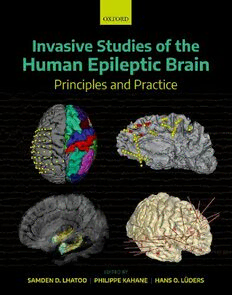Download Invasive Studies of the Human Epileptic Brain: Principles and Practice PDF Free - Full Version
Download Invasive Studies of the Human Epileptic Brain: Principles and Practice by Samden D. Lhatoo, Philippe Kahane, Hans O. Lüders in PDF format completely FREE. No registration required, no payment needed. Get instant access to this valuable resource on PDFdrive.to!
About Invasive Studies of the Human Epileptic Brain: Principles and Practice
No other neurological condition allows the same opportunities for an intracranial electrophysiological study of the human brain as epilepsy does. Epileptic surgery is designed to remove the epileptic focus from the human brain, thereby effecting either cure or substantial reduction of seizures in an individual with an otherwise intractable condition. Its use as a treatment modality dates from the late 19th century, and it has become a widely used treatment option throughout the world in the last 20-30 years. The complexity of epilepsy cases in surgical centres, and the need for invasive electrode studies for pre-surgical evaluation, are both greatly increasing. Invasive Studies of the Human Epileptic Brain is the definitive reference text on the use of invasive electroencephalographic (EEG) diagnostic studies in human epilepsy. Written by some of the most renowned epilepsy experts of the 20th and 21st centuries, the authors provide their expertise and insights into the identification and mapping of intracranial epileptiform and non-epileptiform activity, mapping of the human brain function, and approaches in the use of invasive electroencephalography in a variety of clinical situations. The book is organized into an easily readable series of chapters and is brilliantly illustrated with case studies; each providing an intuitively comprehensive approach to invasive brain studies.
Detailed Information
| Author: | Samden D. Lhatoo, Philippe Kahane, Hans O. Lüders |
|---|---|
| Publication Year: | 2018 |
| ISBN: | 198714661 |
| Pages: | 577 |
| Language: | English |
| File Size: | 227.242 |
| Format: | |
| Price: | FREE |
Safe & Secure Download - No registration required
Why Choose PDFdrive for Your Free Invasive Studies of the Human Epileptic Brain: Principles and Practice Download?
- 100% Free: No hidden fees or subscriptions required for one book every day.
- No Registration: Immediate access is available without creating accounts for one book every day.
- Safe and Secure: Clean downloads without malware or viruses
- Multiple Formats: PDF, MOBI, Mpub,... optimized for all devices
- Educational Resource: Supporting knowledge sharing and learning
Frequently Asked Questions
Is it really free to download Invasive Studies of the Human Epileptic Brain: Principles and Practice PDF?
Yes, on https://PDFdrive.to you can download Invasive Studies of the Human Epileptic Brain: Principles and Practice by Samden D. Lhatoo, Philippe Kahane, Hans O. Lüders completely free. We don't require any payment, subscription, or registration to access this PDF file. For 3 books every day.
How can I read Invasive Studies of the Human Epileptic Brain: Principles and Practice on my mobile device?
After downloading Invasive Studies of the Human Epileptic Brain: Principles and Practice PDF, you can open it with any PDF reader app on your phone or tablet. We recommend using Adobe Acrobat Reader, Apple Books, or Google Play Books for the best reading experience.
Is this the full version of Invasive Studies of the Human Epileptic Brain: Principles and Practice?
Yes, this is the complete PDF version of Invasive Studies of the Human Epileptic Brain: Principles and Practice by Samden D. Lhatoo, Philippe Kahane, Hans O. Lüders. You will be able to read the entire content as in the printed version without missing any pages.
Is it legal to download Invasive Studies of the Human Epileptic Brain: Principles and Practice PDF for free?
https://PDFdrive.to provides links to free educational resources available online. We do not store any files on our servers. Please be aware of copyright laws in your country before downloading.
The materials shared are intended for research, educational, and personal use in accordance with fair use principles.

